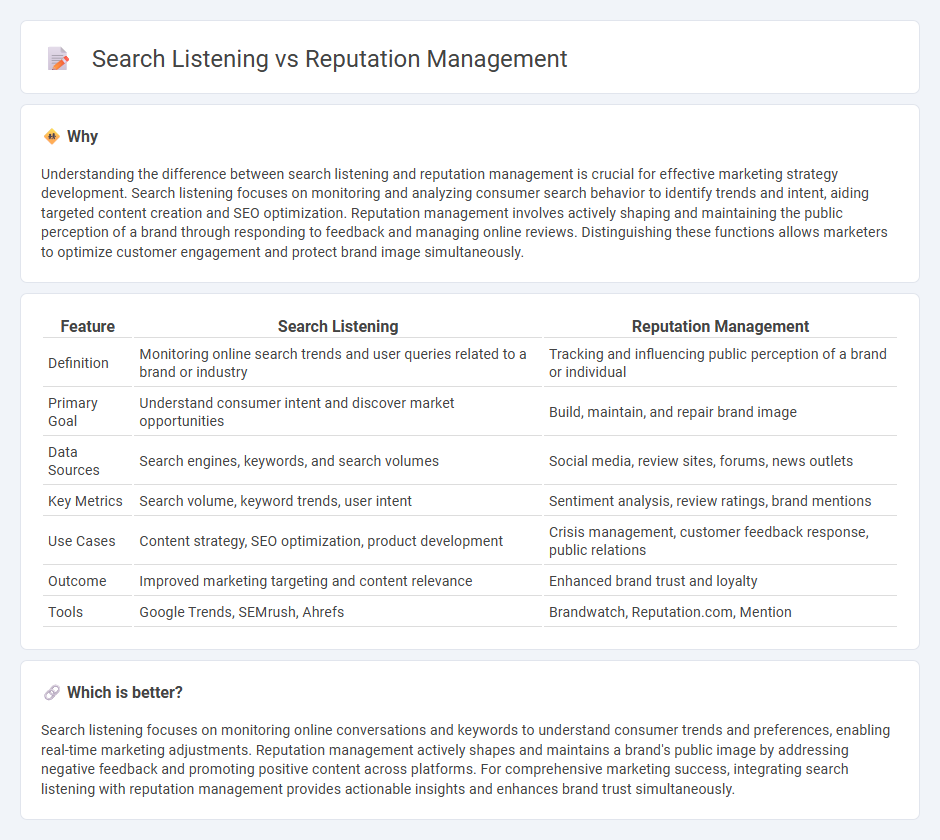
Search listening focuses on monitoring online conversations and consumer behavior to uncover trending topics and brand sentiment. Reputation management involves actively shaping and maintaining a positive public image by addressing negative feedback and promoting positive content. Explore the differences between search listening and reputation management to optimize your marketing strategy.
Why it is important
Understanding the difference between search listening and reputation management is crucial for effective marketing strategy development. Search listening focuses on monitoring and analyzing consumer search behavior to identify trends and intent, aiding targeted content creation and SEO optimization. Reputation management involves actively shaping and maintaining the public perception of a brand through responding to feedback and managing online reviews. Distinguishing these functions allows marketers to optimize customer engagement and protect brand image simultaneously.
Comparison Table
| Feature | Search Listening | Reputation Management |
|---|---|---|
| Definition | Monitoring online search trends and user queries related to a brand or industry | Tracking and influencing public perception of a brand or individual |
| Primary Goal | Understand consumer intent and discover market opportunities | Build, maintain, and repair brand image |
| Data Sources | Search engines, keywords, and search volumes | Social media, review sites, forums, news outlets |
| Key Metrics | Search volume, keyword trends, user intent | Sentiment analysis, review ratings, brand mentions |
| Use Cases | Content strategy, SEO optimization, product development | Crisis management, customer feedback response, public relations |
| Outcome | Improved marketing targeting and content relevance | Enhanced brand trust and loyalty |
| Tools | Google Trends, SEMrush, Ahrefs | Brandwatch, Reputation.com, Mention |
Which is better?
Search listening focuses on monitoring online conversations and keywords to understand consumer trends and preferences, enabling real-time marketing adjustments. Reputation management actively shapes and maintains a brand's public image by addressing negative feedback and promoting positive content across platforms. For comprehensive marketing success, integrating search listening with reputation management provides actionable insights and enhances brand trust simultaneously.
Connection
Search listening enables brands to monitor online conversations and track customer sentiment, providing critical data for effective reputation management strategies. By analyzing search trends and keywords, businesses can identify potential reputation risks early and respond promptly to negative feedback. Integrating search listening into reputation management enhances brand trust and helps maintain a positive digital presence.
Key Terms
**Reputation Management:**
Reputation management involves actively monitoring and influencing public perception of a brand through strategic communication, online reviews, and social media engagement to build trust and credibility. It encompasses crisis management, brand positioning, and customer feedback analysis to maintain a positive company image across various platforms. Explore effective reputation management techniques to strengthen your brand's presence and resilience in competitive markets.
Brand Monitoring
Brand monitoring leverages reputation management and search listening to track and analyze online mentions, enabling businesses to understand public perception and address potential issues in real time. Reputation management focuses on proactively shaping brand image, while search listening captures consumer sentiment and trends from multiple digital channels. Discover how integrating these strategies can enhance your brand's visibility and trust by diving deeper into effective brand monitoring techniques.
Crisis Response
Reputation management focuses on controlling and improving a brand's public perception through strategic communication and proactive measures, while search listening involves monitoring online conversations to identify emerging issues and sentiment trends. In crisis response, reputation management executes planned actions to mitigate damage, whereas search listening provides real-time data to detect and respond swiftly to potential crises. Explore our insights to understand how combining both approaches ensures effective crisis mitigation and brand protection.
Source and External Links
Reputation management - Wikipedia - Reputation management involves influencing, controlling, enhancing, or concealing an individual's or group's reputation, with online reputation management focusing on overseeing digital search results and offline management shaping public perception through media and social responsibility.
Reputation management: The essential guide to protecting your brand - Reputation management is the process of influencing and monitoring public perception about a business or brand, using strategies like online review management, social listening, and crisis communication to build trust and improve visibility.
How Reputation Management Improves Brand Perception - Shopify - Reputation management is the practice of monitoring and influencing public perception--primarily online--through strategies that include responding to feedback, promoting positive stories, and proactively protecting against reputation damage to build credibility and trust.
 dowidth.com
dowidth.com